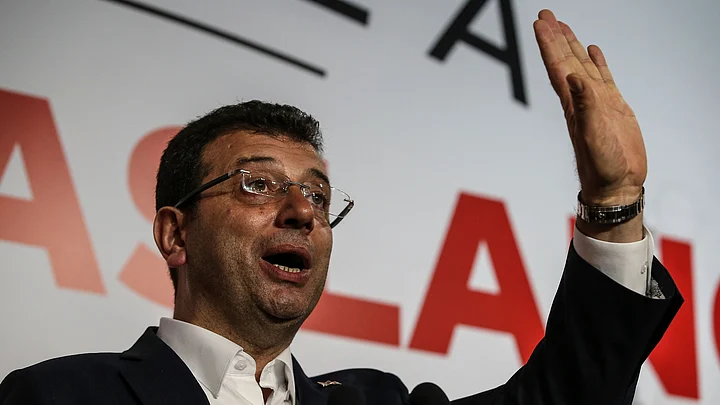Turkey's opposition dealt President Recep Tayyip Erdogan a symbolic blow by gaining ground in key cities in the country's local elections. The opposition won the capital, Ankara, a ruling party stronghold for decades, and was leading a tight race for mayor in Istanbul, according to unofficial figures on Monday, 1 April.
The leader who has dominated Turkish politics for 16 years declared victory despite the opposition gains.
Sunday's local elections were widely seen as a gauge of support for Erdogan as the nation of 81 million faces, a daunting economic recession with double-digit inflation, rising food prices and high unemployment.
It was also a first test for Erdogan — who has been accused of increasingly authoritarian tendencies — since stepping last year into a new presidential role with widely expanded powers.
Behlul Ozkan, an associate professor at Marmara University, said Erdogan's loss of ground in Ankara and Istanbul indicated that his socially conservative and construction-driven policies no longer resonated in the cosmopolitan cities.
"Political Islam's quarter-century old hegemony in Turkey's two largest cities is over," he said. "The basic problem is that Erdogan is not able to get votes from middle-income earners who believe that the economy, education and urban administration are not run well."
More than 57 million people were eligible to vote for the mayors of 30 major cities, 51 provincial capitals and 922 districts in Turkey. The election was marred by sporadic violence, with five dead and scores injured across Turkey.
Even with 99 percent of the votes counted, ballot counts were still underway Monday in the tight race for Istanbul, Turkey's largest city and commercial hub. Unofficial results reported by the state-run Anadolu news agency showed the opposition at 48.8 percent support to the ruling party's 48.5 support.
Ekrem Imamoglu, the opposition candidate in an alliance led by the secular Republican People’s Party, or CHP, declared that he won Istanbul but his rival, former Prime Minister Binali Yildirim of the ruling party, said it was still too early to call.
Yildirim accepted that his rival was leading by some 25,000 votes but said his party would file an objection, suggesting a recount of the 319,500 votes declared void in Istanbul.
"We know how to congratulate, but the process is still ongoing," said Yildirim. "Whoever receives the mandate from the electoral board will be mayor."
Both Ankara, the capital, and Istanbul have been held by Erdogan's Justice and Development Party, the AKP, and its Islamic-oriented predecessor for 25 years. Erdogan's own ascent to power began as Istanbul mayor in 1994.
Unofficial results showed Mansur Yavas, the candidate of the CHP-led alliance, winning the top post in Ankara with 50.9 percent support. The AKP still holds a majority of Ankara’s 25 districts.
The government had led a hostile campaign against Yavas and his party, accusing him of forgery and tax evasion.
AKP secretary general Fatih Sahin said the party would challenge the results in Ankara, claiming alleged mistakes in vote counts could turn to their advantage. The AKP's candidate for Ankara mayor, Mehmet Ozhaseki, won 47.1 percent support.
The secular opposition also made significant gains in provinces along the Mediterranean, including taking the city of Adana from the nationalists and the tourism destination of Antalya from the ruling party. It also retained its hold over Izmir, Turkey's third-largest city.
A strategic decision by a pro-Kurdish party to sit out critical races in major cities contributed to the opposition's gains.
Erdogan was not running for office Sunday but he is the dominant figure of the party and the face of the campaign, rallying tirelessly for months across Turkey.
Speaking from party headquarters in Ankara early Monday, Erdogan said he and his allies had come out first with more than half of the votes across Turkey. Admitting setbacks, he said the party would work to understand what had gone wrong and fix where they failed.
Andrew Dawson, heading the Council of Europe's election observation mission, said Monday his monitors were "not fully convinced that Turkey currently has the free and fair electoral environment which is necessary for genuinely democratic elections in line with European values and principles."
He commended the Turkish public for the high turnout rate of 84 percent and called it a "sign of healthy democratic interest."
In predominantly Kurdish provinces, a pro-Kurdish party won seven top mayoral seats but lost some strongholds, including southeastern Sirnak province, to the ruling party.
Since 2016, the government has replaced 95 elected municipal, provincial or district mayors with government-appointed trustees in a crackdown on the Peoples' Democratic Party, or HDP, for alleged links to outlawed Kurdish militants.
The Council of Europe acknowledged Turkey's security concerns but said Turkey's definition of terrorism was not consistent with European standards.
Dawson urged the Turkish government to respect the election results.
"We do not accept assertions that assume every HDP mayor is or could be a terrorist or has terrorist connections," Dawson said.
Political parties can submit their objections for three days and official results are expected in the coming days.
(Published in an arrangement with the Associated Press.)
(At The Quint, we question everything. Play an active role in shaping our journalism by becoming a member today.)
